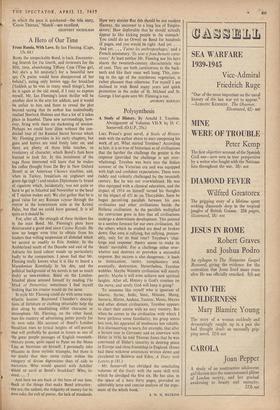Polysynthesis
A Study of History. By Arnold J. Toynbee. Abridgement of Volumes VII-X by D. C. Somervell. (O.U.P., 25s.)
LIKE Proust's great novel, A Study of History ends with the author about to start composing his work of art. What started Toynbee? According to him, it is as true of historians as of civilisations that the harsher the challenge the greater is the response (provided the challenge is not over- . whelming). Toynbee was born into the Indian summer of the Victorian era and was equipped with high and confident expectations. These were rudely and violently challenged by the twentieth century. But he was not overwhelmed. He was also equipped with a classical education, and the impact of 1914 on himself turned his thoughts to the impact of 431 BC on Thucydides. Soon he began perceiving parallels between his own civilisation and other civilisations beside the Hellenic civilisation. As the parallels multiplied the conviction grew in him that all civilisations undergo a determinate development. This pointed to a sombre forecast for our own civilisation. All the others which he studied are dead or broken down. Our own is rallying, but rallying, presum- ably, only for its final rout? Toynbee's 'chal- lenge and response' theory seems to make its 'death' inevitable. For a challenge either over- whelms and destroys or provokes a successful response. But success is also dangerous : it leads to intoxication, vanity, complacency and, eventually, destruction. Nevertheless, Toynbee wobbles. Maybe Western civilisation will merely petrify. Maybe it will even achieve new spiritual heights. After all, History is God's creation on the move, and surely God will keep it going?
To someone like myself who is ignorant of Islamic, Syriac, Indic, Sinic, Minoan, Shang, Sumeric, Hittite, Andean, Tucatec, Mexic, Mayan and other distant civilisations, Toynbee appears to chart their course with an easy mastery. But when he comes to the civilisation with which I have perforce some familiarity, his grasp seems less sure, his appraisal 'of tendencies less reliable. It is disconcerting to learn, for example, that after a lecture tour in Germany and an interview with Hitler in 1936, he told Thomas Jones that he was convinced of Hitler's sincerity in desiring peace in Europe and close friendship in England. (Jones had these welcome assurances written down and circulated to Baldwin and Eden, A Diary with Letters, p. 181.) Mr. Somervell has abridged the concluding volumes of the Study with the same skill with which he abridged the first six. He has also, in the space of a bare forty pages, provided an admirably terse and concise analysis of the argu- ment of the whole book.
J. W. N. WATKINS


































 Previous page
Previous page